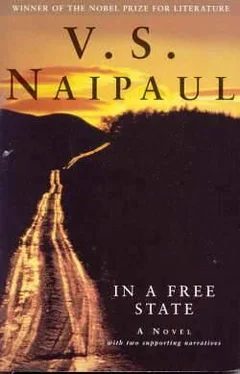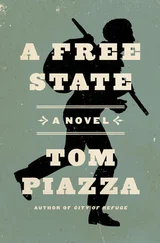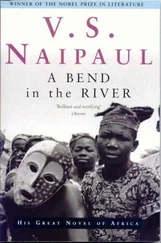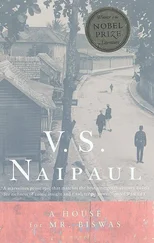Vidiadhar Naipaul - In A Free State
Здесь есть возможность читать онлайн «Vidiadhar Naipaul - In A Free State» весь текст электронной книги совершенно бесплатно (целиком полную версию без сокращений). В некоторых случаях можно слушать аудио, скачать через торрент в формате fb2 и присутствует краткое содержание. Жанр: Современная проза, на английском языке. Описание произведения, (предисловие) а так же отзывы посетителей доступны на портале библиотеки ЛибКат.
- Название:In A Free State
- Автор:
- Жанр:
- Год:неизвестен
- ISBN:нет данных
- Рейтинг книги:5 / 5. Голосов: 1
-
Избранное:Добавить в избранное
- Отзывы:
-
Ваша оценка:
- 100
- 1
- 2
- 3
- 4
- 5
In A Free State: краткое содержание, описание и аннотация
Предлагаем к чтению аннотацию, описание, краткое содержание или предисловие (зависит от того, что написал сам автор книги «In A Free State»). Если вы не нашли необходимую информацию о книге — напишите в комментариях, мы постараемся отыскать её.
«V. S. Naipaul tells stories which show us ourselves and the reality we live in. His use of language is as precise as it is beautiful.» – The London Times
«A Tolstoyan spirit…The so-called Third World has produced no more brilliant literary artist.» – John Updike, The New Yorker
«The coolest literary eye and the most lucid prose we have.» – The New York Review
In A Free State — читать онлайн бесплатно полную книгу (весь текст) целиком
Ниже представлен текст книги, разбитый по страницам. Система сохранения места последней прочитанной страницы, позволяет с удобством читать онлайн бесплатно книгу «In A Free State», без необходимости каждый раз заново искать на чём Вы остановились. Поставьте закладку, и сможете в любой момент перейти на страницу, на которой закончили чтение.
Интервал:
Закладка:
I was the fourth child and the second son. The world change around me when I was growing up. I see people going away to further their studies and coming back as big men. I know that I miss out. I know how much I lose when I have to stop school, and I decide that it wasn't going to be like that for my younger brother. I feel I see things so much better than the rest of my family; they always tell me I am very touchy. But I feel I become like the head of the family. I get the ambition and the shame for all of them. The ambition is like shame, and the shame is like a secret, and it is always hurting. Even now, when it is all over, it can start hurting again. Frank can never see what I see in my mind.
A man used to live near us in a big two-storey house. The house was of concrete, with decorated concrete blocks, and it was in a lovely ochre colour with chocolate wood facings,· everything so neat and nice it look like something to eat. I study this house every day and I think of it as the rich man's house, because the man was rich. He was rich, but once upon a time he was poor, like us, and the story was that he had a few acres of oil land in the south. A simple man, like my father, without too much education. But in my eyes the oil land and the luck and the money and the house make this man great.
I worship this man. Nothing extravagant about him; sometimes you could see him standing up on the road waiting for a bus or a taxi to go to town, and if you didn't know who he was you wouldn't notice him. I study everything about him, seeing luck and money in everything, in the hair he comb, in the shirt his hands button, in the shoes his hands lace up. He live alone in the house. His children married, and the story is that he don't get on with his family, that he is a man with a lot of worries. But to me even that is part of the greatness.
One time there was a wedding in the village, the old-fashioned all-night wedding, and the rich man lend his house. And on the wedding night I went in the house for the first time. The house that look so big from the outside is really very small inside.
Downstairs is just concrete pillars, walls around open space. Upstairs is five small rooms, not counting galleries back and front. The lights dim, dim. It is what I remember most. That and the dead-rat smell. You feel dust everywhere, dust falling on you even while you walk. It isn't dust, it is the droppings from woodlice, hard smooth tiny eggs of wood that roll below your hand if you put your hand down anywhere.
The drawing-room choke up with furniture, Morris suite and centre tables arld everything else; but you feel that if you press too hard on anything it will crush. Just the furniture, nothing else in the drawing-room, no pictures or calendars even, nothing except for a pile of Christian magazines, Jehovah's Witness or something like that, things that the rest of us throwaway but he the rich man keep, and he is not even a Christian. The place is like a tomb. It is as though nobody live there, as though the rich man don't know why he build the house.
And then one day somebody shoot the man. For money, for some family bad blood, nobody know. It is another country mystery. The black police nail up Five Hundred Dollars Reward posters everywhere, as though the village is suddenly like Dodge City or like something in _Juse James__, with Henry Fonda and Tyrum Powers just around the corner.
Everybody wait for the drama. But no drama happen. The posters fade and tear, the police forget, the house remain. The ochre paint discolour, the galvanize roof rust and the rust run down the walls, and the damp run up fast from the ground like a bright green bush. The bright green get dark, it get black, real bush grow up in front of it. Mildew stain the house, the roof is all rust. The paint wash off the woodwork, the grain of the wood begin to show, the wood begin to get hollow, the soft parts melting away, until only the hard grain remain, like a skeleton. And all the time I live there the house just standing there like that.
I see now that the man I thought was a rich man wasn't rich at all. And from here, from this city which is like a country, I feel I could look down and see that whole village in the damp tlat·lands, the lumpy little pitch road, black between the green sugarcane, the ditches with the tall grass, the thatched huts, water in the yellow yards after rain, and the rusty roof of that one concrete house rotting. \ \ *
You wonder how people get to a village like that, how that place become their home. But it is home, and on a sunny Sunday morning, nobody working, see everybody relaxing in their front yards, a few zinnias growing here and there, a few marigolds and old maid and coxcomb and lady's slipper and the usual hibiscus. The barber making his round, people sitting down below mango trees and getting their hair cut. And in my mind it is on a morning like this that I can see my father's younger brother coming up the pitch road on his bicycle.
My father's brother is living in the city. How he get there, how he get education when my father get none, how he get this job with the lawyer, all of this happen a long time ago, before I was born, and is now like a mystery. He is a Christian, or he take a Christian name, Stephen, as a mark of his progressiveness. My father does mock him behind his back for that name, but all of us are proud of Stephen and we well enjoy the little fame and respect he give us in the village.
It is a big thing when he come to visit us. The neighbours spreading the news in advance, my mother chasing and killing a chicken right away, my father getting out the rum bottle and glasses and water. Fete! And at the end, just before he leave, Stephen sharing out coppers to the children for the Sunday 4.30 matinee double.
Or so it used to be. I adore Stephen when I was small. And adoring him like this, I used to think that he live alone in the city, that we was his only family. But then I get let down. I realize that Stephen have his own family, that he have a whole heap of girl children, going to the Convent, and that he have his own son, a bright boy, a great student, and he worship this son. The boy is my own age too, or just a little older. Once or twice he come to see us. He is nice and quiet, not pulling any style on us, and you could see that in a special way my father is prouder of him than he is of me or my younger brother, that Stephen's son is what he expect, different, a bright boy and a future professional. My father don't give him coppers for a matinee. He send him a Shirley Temple fountain pen, a Mickey Mouse wristwatch.
Stephen never tell us when he is coming, and you wonder why a man like that would decide to leave his family on a Sunday morning to come and have a country fete with us. My father say that Stephen is glad to get away from that modern life sometimes, that Stephen is not happy with his Christian wife, and that Stephen, because of his progressiveness, is full of worries. I don't know what worries a man like Stephen could have. And if he have worries, they don't always show.
Stephen is a joker and a mocker. Even before he put his bicycle in the shade, even before he take off his hat and bicycle clips, even before he take the first shot of rum, Stephen start mocking. I don't know why he find our donkey so funny; it is as though he never see one before. He mock us because of the donkey; he mock us when the donkey die. Then when we buy the lorry and it get laid up for a few weeks below the house, blocks of wood below the axle, he mock us because of that. Everything we do is only like a mockery to Stephen, and my father encourage him by laughing.
Stephen mock me a lot too, in the beginning. 'When you marrying off this one?' he used to ask my father, even when I was small. My father always laugh and say, 'Next season. I got a nice girl for him.' But as I grow older I show I don't appreciate the humour, and Stephen stop mocking me.
Читать дальшеИнтервал:
Закладка:
Похожие книги на «In A Free State»
Представляем Вашему вниманию похожие книги на «In A Free State» списком для выбора. Мы отобрали схожую по названию и смыслу литературу в надежде предоставить читателям больше вариантов отыскать новые, интересные, ещё непрочитанные произведения.
Обсуждение, отзывы о книге «In A Free State» и просто собственные мнения читателей. Оставьте ваши комментарии, напишите, что Вы думаете о произведении, его смысле или главных героях. Укажите что конкретно понравилось, а что нет, и почему Вы так считаете.











